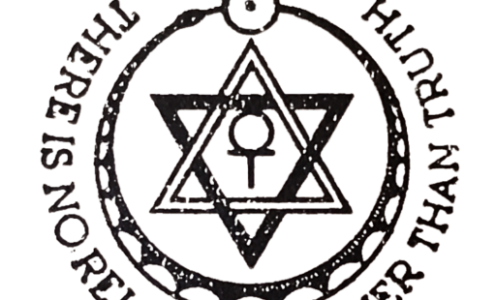The Theosophical Society is an international organization founded in New York City on November 17, 1875, by Helena Petrovna Blavatsky, Henry Steel Olcott, William Quan Judge, and others with the purpose of preserving the wisdom of the ages, which has been accumulated by humanity throughout history from various cultures and traditions, to help humankind grow and evolve.
There Is No Religion Higher Than Truth
Satyan Nasti Paro Dharmah — The Ultimate Spiritual Path is Realization and Integration with the Intrinsic Nature of Reality —
Mahabharata (Sântiparvan, chapter 160, stanza 24)
Theosophical Worldview
The Theosophical Society, while reserving for each member full freedom to interpret those teachings known as Theosophy, is dedicated to preserving and realizing the ageless wisdom, which embodies both a worldview and a vision of human self-transformation.
Fundamental Propositions
This tradition is founded upon certain fundamental propositions.
- The universe and all that exists within it are one interrelated and interdependent whole.
- Every existent being-from atom to galaxy-is rooted in the same universal, life-creating Reality. This Reality is all pervasive but it can never be summed up in its parts since it transcends all its expressions. It reveals itself in the purposeful, ordered, and meaningful processes of nature as well as in the deepest recesses of the mind and spirit.
- Recognition of the unique value of every living being expresses itself in reverence for life, compassion for all, sympathy with the need of all individuals to find truth for themselves, and respect for all religious traditions. The ways in which these ideals become realities in individual life are both the privileged choice and the responsible act of every human being.
The Three Objects
| First Object | To form a nucleus of the universal brotherhood of humanity, without distinction of race, creed, sex, caste, or color. |
| Second Object | To encourage the comparative study of religion, philosophy, and science. |
| Third Object | To investigate unexplained laws of nature and the powers latent in humanity. |
The Philosophy of the Society
The Theosophical Society maintains the right of individual freedom of thought for every member. Nobody is asked to give up the teachings of his or her own faith. To ensure this right, the General Council of the Theosophical Society passed the Freedom of Thought resolution in 1924. Just as all members of the Society are free to hold their own beliefs and follow their own practices, no one can impose his or her particular views or aims on the Society, which has its own declared Objects. To ensure this freedom of the organization, the General Council of the Theosophical Society passed the Freedom of the Society resolution in 1949.
Freedom of Thought
As the Theosophical Society has spread far and wide over the world, and as members of all religions have become members of it without surrendering the special dogmas, teachings and beliefs of their respective faiths, it is thought desirable to emphasize the fact that there is no doctrine, no opinion, by whomsoever taught or held, that is in any way binding on any member of the Society, none which any member is not free to accept or reject. Approval of its three Objects is the sole condition of membership.
No teacher, or writer, from H.P. Blavatsky onwards, has any authority to impose his or her teachings or opinions on members. Every member has an equal right to follow any school of thought, but has no right to force the choice on any other. Neither a candidate for any office nor any voter can be rendered ineligible to stand or to vote, because of any opinion held, or because of membership in any school of thought. Opinions or beliefs neither bestow privileges nor inflict penalties.
The Members of the General Council earnestly request every member of the Theosophical Society to maintain, defend and act upon these fundamental principles of the Society, and also fearlessly to exercise the right of liberty of thought and of expression thereof, within the limits of courtesy and consideration for others.
Freedom of the Society
The Theosophical Society, while cooperating with all other bodies whose aims and activities make such cooperation possible, is and must remain an organization entirely independent of them, not committed to any objects save its own, and intent on developing its own work on the broadest and most inclusive lines, so as to move towards its own goal as indicated in and by the pursuit of those objects and that Divine Wisdom which in the abstract is implicit in the title, The Theosophical Society. Since Universal Brotherhood and the Wisdom are undefined and unlimited, and since there is complete freedom for each and every member of the Society in thought and action, the Society seeks ever to maintain its own distinctive and unique character by remaining free of affiliation or identification with any other organization.
Our Commitment
The Theosophical Society imposes no dogmas, but points toward the source of unity behind all differences. Devotion to truth, love for all living beings, and commitment to a life of active altruism are the marks of the true Theosophist.
Central to the concerns of theosophy is the desire to promote understanding and unity among people of all races, nationalities, philosophies, and religions. Therefore, all people, whatever their race, creed, sex, caste, or color, are invited to participate equally in the life and work of the Society.


